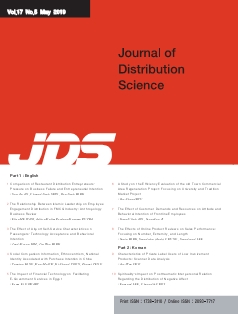The Effect of Airport Self-Service Characteristics on Passengers’ Technology Acceptance and Behavioral Intention
- 한국유통과학회
- 유통과학연구(JDS)
- 제17권 제5호
-
2019.0529 - 37 (9 pages)
- 19

Purpose - This paper analyzes the effects of the SST characteristics at airports on behavioral intention through technology acceptance and customer satisfaction, and presents a strategic plan for introducing SSTs to airports providing differentiated services. Research design, data, and methodology - We examine the role of airport self-service characteristics and access the influence of the Technology Acceptance Model (TAM) on both customer satisfaction and behavioral intentions towards SSTs. To do this, a survey is conducted with passengers having used self-service technologies(SSTs) at Incheon International Airport. A total of 400 questionnaires are then analyzed using structural equation modeling. Results - According to the results, of the self-service characteristics, customer satisfaction and behavioral intention were affected by optimism through perceived ease of use, perceived usefulness, and perceived enjoyment and by innovativeness and insecurity through perceived ease of use. Conclusions - According to the results of the study, the purpose of using TBSS in the airport is to save time and convenience. Therefore, it is necessary to closely analyze the differences in technology acceptance by age and generation, increase user self-efficacy, increasing satisfaction through effective management of cognitive and emotional waiting time will have a positive impact on behavioral intentions.
1. Introduction
2. Main discourse
3. Methodology
4. Empirical Results
5. Conclusion
(0)
(0)